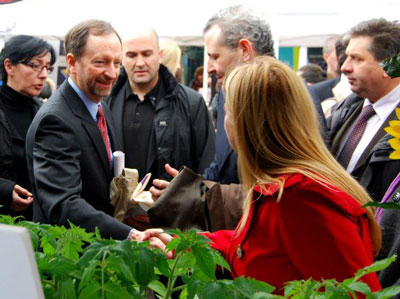A degree of peace
Kristina Šešlija ’10 works promoting reconciliation in her native Bosnia-Herzegovina
March 26, 2014
By Adam Tucker '14

Kristina Šešlija '10 shakes hands with the U.S. Ambassador to Bosnia Herzegovina, Patrick Moon.
Kristina Šešlija may have grown up with war, but peace has become her profession.
Growing up in the civil war-torn European nation of Bosnia-Herzegovina, Šešlija lived through three years of war from 1992-95 that left between 100,000-200,000 dead and millions displaced. And for the 2010 CSB graduate, returning her country to peace and prosperity is both a goal and a dream.
But the road to working for peace and reconciliation has not been an easy one. Šešlija lived through the war during high school in Sarajevo in the early 1990s, and it was common to hear about the death of family and friends.
"She deserves much credit for being committed to working for reconciliation with people from the groups that killed some of her family members and friends," CSB/SJU peace studies associate professor and former adviser Ronald Pagnucco said.
Šešlija enrolled at CSB and moved to the United States with her husband and two daughters in 2006, after meeting a Saint John's alumnus working in reconciliation and relief efforts in the country
"Going to CSB/SJU, as well as living in St. Joseph, was quite challenging in many ways," Šešlija said. "Being in a new environment, using a different language made me stronger as a person. (CSB gave me) the sense of courage, self-confidence in what I can do and the challenges that awaited."
Mozaik
Since graduating, Šešlija works with the Mozaik Foundation in Bosnia-Herzegovina on reconciliation projects that promote economic healing in a country after war — a goal that Pagnucco said is of utmost importance.
Pagnucco said that civil war is common for a number of causes, but that one major reason is the lack of reconciliation among people in the county, and the enduring hostility and negative feelings people have toward one another contribute to the likelihood of more war.
Her roles with Mozaik have ranged from promoting and funding business ventures and sustainable growth in impoverished areas to projects on women's empowerment in Bosnia-Herzegovina. Šešlija herself is responsible for the organization's grant funding — over $1 million in total - designed to help thousands of different projects across Bosnia-Herzegovina to engage and teach youth.
"Mozaik and those who support it will invest funds which will be used to create socially responsible young entrepreneurs," Šešlija said.
The projects Šešlija works on not only allow her to enact real change (she was even arrested for her efforts at one point) but prove to her on a daily basis the value of her CSB/SJU education.
"I was empowered to influence things, to grow and learn (at CSB). It is more than just a classroom — volunteering, service, internships - all prepares us to be better people, gives us necessary belief in what we want to do," Šešlija said. "After the war it was even harder, more uncertainties and more opportunities, and reconciliation was not for most, only for a few. But I believed, and believing made me somewhat of an outcast."
A peaceful education
Šešlija's work on preventing more civil wars and promoting peace was influenced by her time at CSB, where she said the inspiration and support she received has allowed her to tell her daughter that her mother is, in fact, saving the world. Her work with international reconciliation and peace, after growing up in such turmoil, would never have been possible without the support of those she met in St. Joseph.
"Liberal arts at CSB/SJU offers you the opportunity to receive an education and be ready to use it practically after graduation," Šešlija said. "Our whole CSB/SJU community is always welcome with the Šešlija family, as that is the least we can do since we felt so welcome throughout our four years in the U.S."
